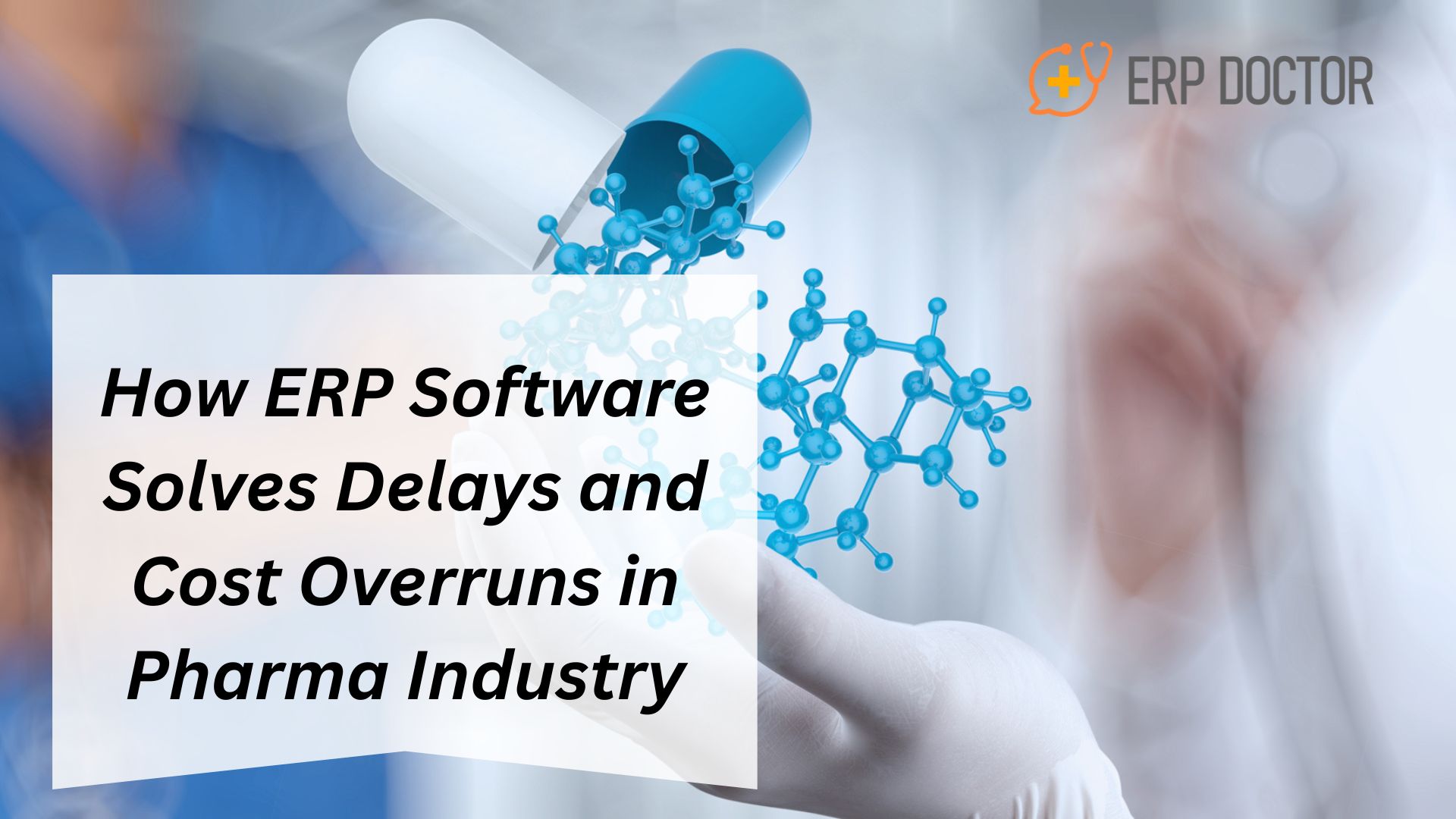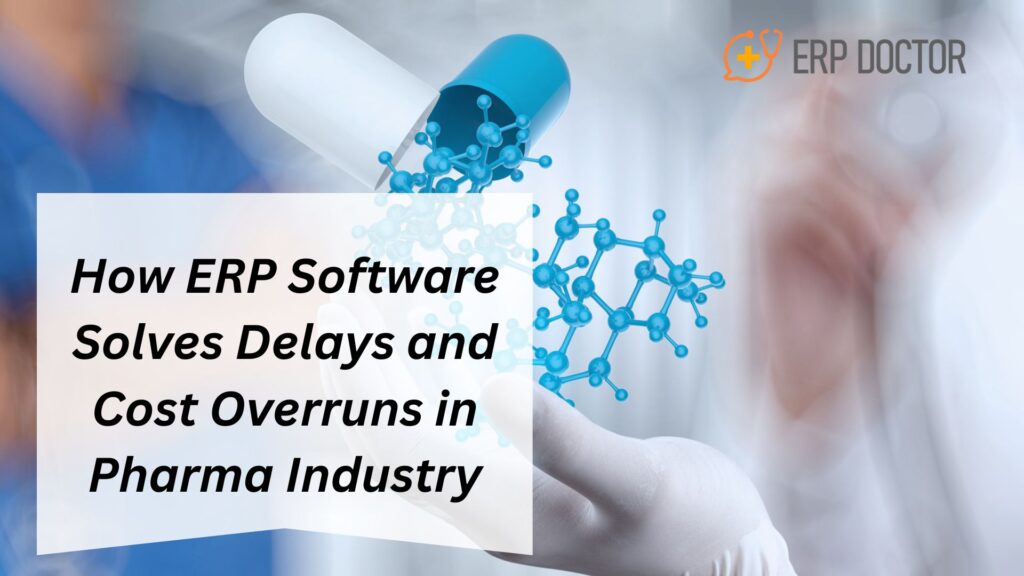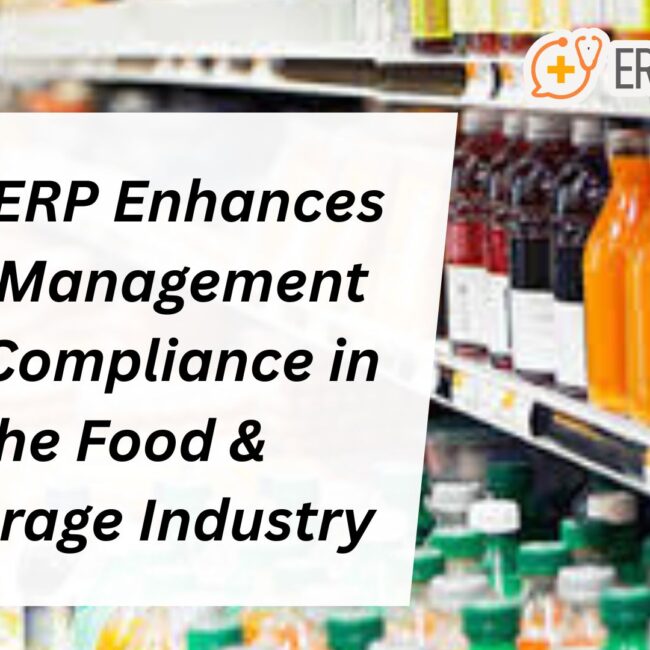
How ERP Software Solves Delays and Cost Overruns in Pharma Industry

Is ERP the Secret to Cost Efficiency in the Pharma Sector?
The pharmaceutical industry is one of the most regulated and complex sectors, where timely production and cost efficiency are critical to success. Unfortunately, delays and cost overruns are common challenges in pharma manufacturing due to inefficient processes, compliance issues, and poor inventory management. ERP for Pharma Industry offers a comprehensive solution to these challenges by integrating key business operations, improving real-time visibility, and ensuring regulatory compliance. In this blog, we explore how ERP implementation for Pharma Industry can eliminate inefficiencies and optimize costs.
Why Delays and Cost Overruns Occur in the Pharma Industry
- Manual Process Bottlenecks: Manual data handling leads to errors and delays.
- Inefficient Inventory Management: Stockouts and overstocking increase costs and disrupt supply chains.
- Regulatory Compliance Issues: Failure to meet stringent compliance requirements results in penalties and delays.
- Lack of Real-time Visibility: Poor data management limits decision-making and creates operational inefficiencies.
- Inaccurate Demand Forecasting: Misaligned production planning causes either underproduction or overproduction.
How ERP Software Addresses These Challenges
1. Automates Processes to Reduce Manual Errors
ERP software automates routine tasks, reducing manual errors and improving process efficiency. With real-time data synchronization across departments, the likelihood of delays and data discrepancies is minimized.
2. Improved Inventory and Supply Chain Management
ERP for Pharma Industry helps optimize inventory by maintaining an ideal stock level, reducing stockouts, and avoiding overstocking. It provides real-time insights into procurement, inventory, and distribution, ensuring seamless supply chain management.
3. Ensures Regulatory Compliance and Quality Control
Pharmaceutical industries must adhere to stringent regulatory standards such as FDA, GMP, and ISO. ERP systems ensure compliance by tracking batch records, managing audits, and providing documentation for regulatory requirements.
4. Enhanced Real-time Visibility and Reporting
With real-time dashboards and comprehensive reporting, ERP implementation for Pharma Industry provides complete visibility into production, inventory, and finances. This empowers management to make informed decisions quickly, preventing cost overruns and unexpected delays.
5. Accurate Demand Forecasting and Production Planning
ERP systems utilize advanced data analytics to improve demand forecasting accuracy. This ensures that production is aligned with market demand, avoiding overproduction and minimizing wastage.
Key Benefits of ERP Implementation for Pharma Industry
- Reduced Operational Costs: Automating processes reduces labor costs and improves efficiency.
- Faster Time-to-Market: Streamlined production and inventory management result in quicker product delivery.
- Improved Compliance and Risk Management: ERP ensures compliance with regulatory standards, mitigating potential risks.
- Optimized Resource Utilization: Real-time insights allow better allocation of resources and time management.
Case Study: Successful ERP Implementation in a Pharma Company
A leading pharmaceutical company implemented ERP to address recurring delays in product launches and high operational costs. Within six months, the company witnessed:
- 30% reduction in production delays.
- 20% improvement in inventory turnover.
- 15% decrease in compliance-related errors. This success story highlights how ERP for Pharma Industry drives measurable results.
Conclusion: Future-Proof Your Pharma Business with ERP
The challenges of managing pharmaceutical operations efficiently can be overcome with the right ERP implementation for Pharma Industry. ERP systems streamline processes, enhance visibility, and ensure compliance, ultimately reducing delays and cost overruns. Investing in a reliable ERP solution not only boosts operational efficiency but also positions your company for long-term growth and success.
FAQs
1. How does ERP improve regulatory compliance in the pharma industry?
ERP software automates compliance processes, tracks batch records, and ensures adherence to industry regulations, reducing the risk of non-compliance.
2. Can ERP software reduce production delays in pharmaceutical companies?
Yes, by automating workflows and improving real-time visibility, ERP reduces errors and accelerates the production process.
3. How does ERP help in managing inventory effectively?
ERP optimizes inventory levels by preventing stockouts and reducing wastage, ensuring efficient inventory management.
4. What is the ROI of implementing ERP in the pharma industry?
Pharmaceutical companies typically experience reduced operational costs, faster time-to-market, and improved compliance, resulting in a high ROI.
5. How long does it take to implement ERP in a pharmaceutical company?
The duration depends on the company size and complexity, but ERP implementation usually takes 6–12 months with proper planning and execution.
Looking to implement ERP software for your pharma business? Contact us at https://erpdoctor.in/ today to explore customized ERP solutions that cater to the unique needs of the pharmaceutical industry.





